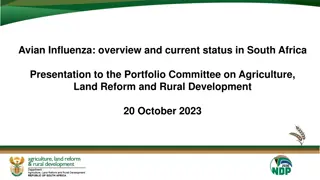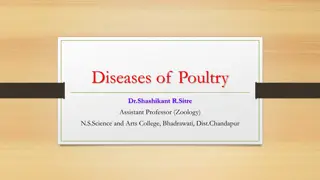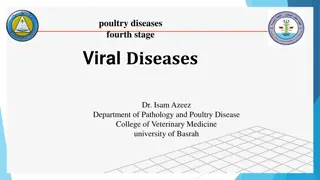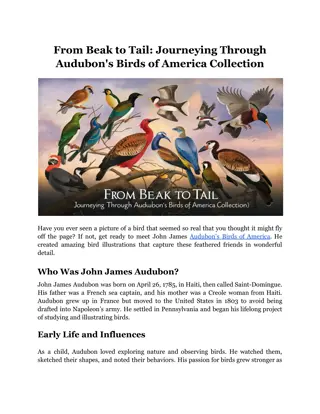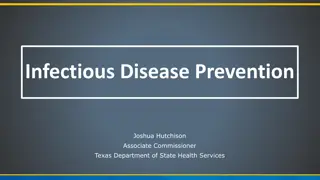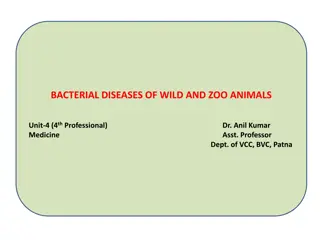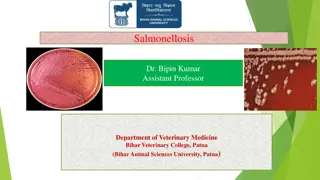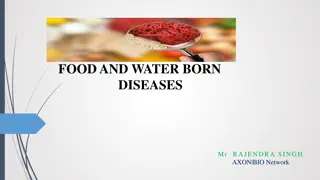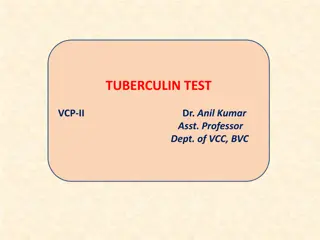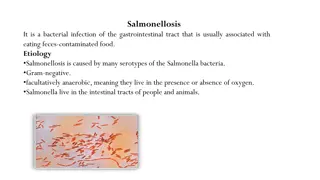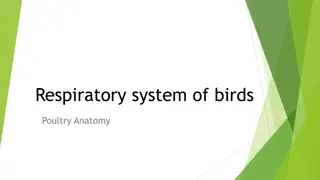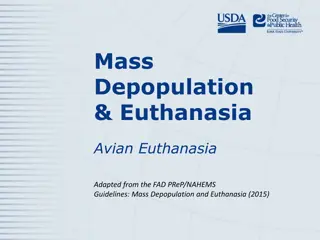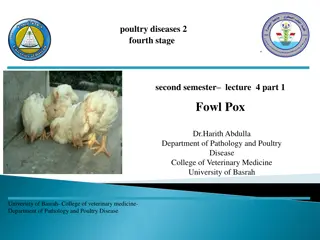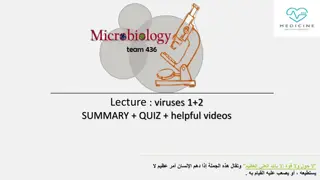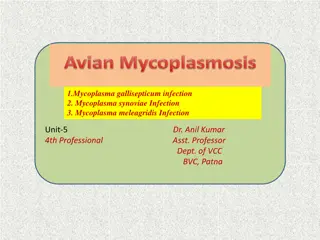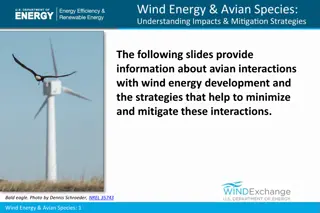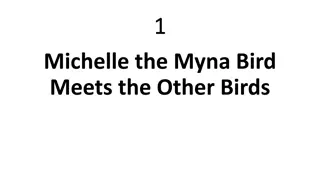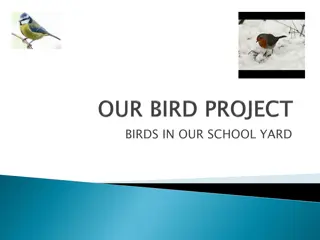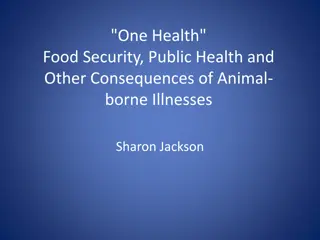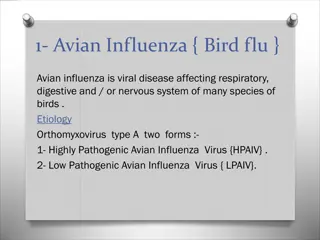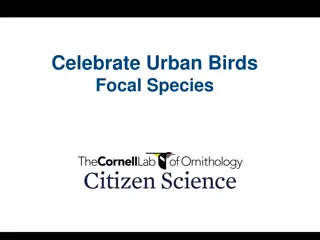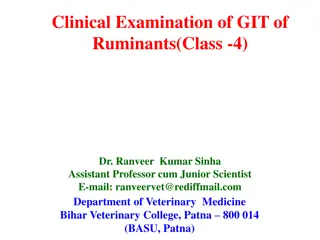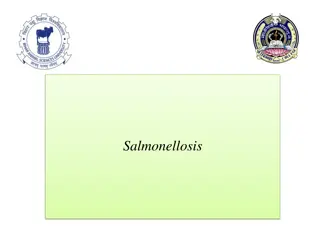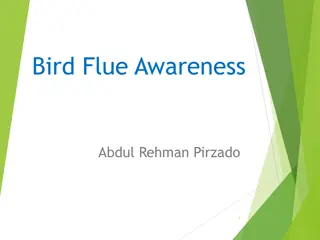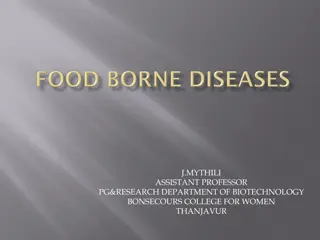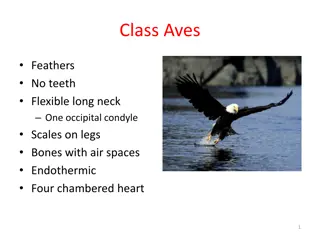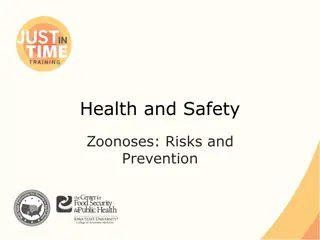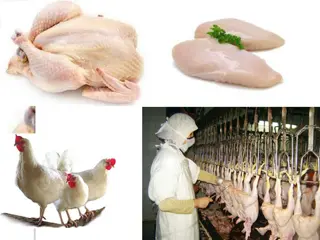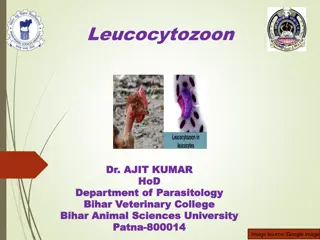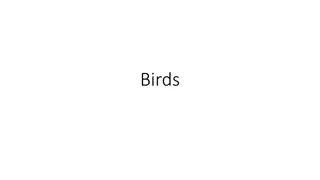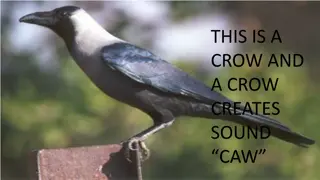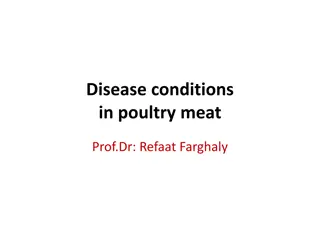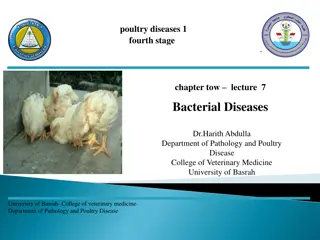Avian Hazard Advisory System (AHAS) Update
The latest updates to the Avian Hazard Advisory System (AHAS) providing crucial bird hazard information for flight safety. Learn about calculating NEXRAD risk, regional mosaics, flying areas, and risk management.
0 views • 23 slides
Impact of Highly Pathogenic Avian Influenza 2023 on South African Broiler Industry
The presentation by the South African Poultry Association sheds light on the detrimental effects of Highly Pathogenic Avian Influenza (HPAI) on the broiler industry in South Africa. Factors such as load shedding, water supply interruptions, and now, the outbreak of H7N6, have exacerbated the financi
4 views • 19 slides
Avian Influenza Overview and Outbreak History in South Africa
Avian Influenza, specifically Highly Pathogenic Avian Influenza (HPAI) outbreaks in South Africa, have been documented since 2004, affecting primarily ostriches and poultry. Wild bird transmission remains a concern, with risk factors such as rainfall, temperature, wetlands, and poultry movements con
2 views • 25 slides
Overview of Poultry Diseases and their Causes
Poultry diseases caused by viruses and bacteria are a significant concern for poultry farmers. Viral diseases like Ranikhet Disease, Fowl Pox, and Avian Leucosis can have high mortality rates and severe symptoms. Bacterial diseases such as Tick Fever, Tuberculosis, Fowl Cholera, and Infectious Coryz
2 views • 12 slides
Understanding Viral Diseases in Poultry: Newcastle Disease and Avian Influenza
Viral diseases like Newcastle Disease (ND) and Avian Influenza (AI) pose significant threats to poultry farming, impacting bird health and production. ND, caused by Avian paramyxovirus type 1, is highly contagious and manifests in various forms affecting birds' respiratory and nervous systems. On th
7 views • 24 slides
Want to Spice Up Your Vacation Why Not Try Paddleboarding in Florida
Aside from manatees, Silver Springs is teeming with diverse wildlife waiting to be discovered. Keep your eyes peeled for playful otters, graceful herons, and majestic bald eagles as you navigate through the waterways. Birdwatchers will be delighted by the myriad of avian species that call this area
2 views • 6 slides
From Beak to Tail_ Journeying Through Audubon's Birds of America Collection
Explore John James Audubon's \"Birds of America\" collection - a stunning journey through the avian world from feathers to flight!
1 views • 5 slides
Update on Avian Influenza A(H5N1) Outbreak in the U.S.
Avian Influenza A(H5N1) has been detected in domestic livestock and a few human cases have been reported in the U.S. The CDC issued a technical report detailing the cases and their symptoms. No human-to-human transmission has been identified so far. The situation is being closely monitored and updat
0 views • 17 slides
Update on Infectious Disease Prevention and H5N1 Vaccine Production
This content provides updates on infectious disease prevention efforts, including historical data, TB data posting schedule, and HIV surveillance updates. It also highlights the plans of the US Department of Health and Human Services to produce 4.8 million doses of the H5N1 avian flu vaccine for pan
0 views • 7 slides
Bacterial Diseases Impacting Wild and Zoo Animals: An Overview
Learn about anthrax, tuberculosis, and salmonellosis, three significant bacterial diseases affecting wild and zoo animals. Understand their etiology, hosts, transmission, diagnosis, prevention, and treatment to safeguard animal populations effectively.
0 views • 11 slides
Salmonellosis: Causes, Clinical Presentations, and Transmission
Salmonellosis is caused by the gram-negative bacterium Salmonella enterica. It predominantly affects warm-blooded vertebrates, leading to carrier states, septicemia, enteritis, and other clinical presentations like abortion and arthritis. The disease is transmitted through contaminated foods of anim
0 views • 15 slides
Understanding Food and Water-Borne Diseases: Causes and Classification
Food and water-borne diseases, caused by contaminated food or water, lead to acute illnesses. These diseases are classified into food-borne infections and food-borne intoxications. Food-borne infections, triggered by pathogenic microorganisms, can be fungal, bacterial, viral, or parasitic, with long
3 views • 57 slides
Understanding Tuberculin Testing in Veterinary Medicine
Tuberculin tests have been vital in diagnosing latent and active tuberculosis in animals for over a century. Different methodologies and types of tuberculin, including avian and bovine, serve to differentiate between various forms of the disease. Procedures like the Single Intradermal Test (SID) are
0 views • 9 slides
Understanding Salmonellosis: Causes, Symptoms, and Prevention
Salmonellosis is a bacterial infection of the gastrointestinal tract caused by various serotypes of Salmonella bacteria. It affects both animals and humans, commonly spread through contaminated food sources. Symptoms in humans include diarrhea, abdominal cramps, and fever, with potential complicatio
0 views • 8 slides
Anatomy of the Respiratory System in Birds: A Detailed Overview
The respiratory system in birds, including poultry, consists of various components such as nostrils, nasal cavities, larynx, trachea, syrinx, air sacs, and lungs. Each part plays a crucial role in respiration, with unique features adapted to avian physiology. Understanding the anatomy of the avian r
0 views • 19 slides
Guidelines for Avian Euthanasia and Mass Depopulation
Avian euthanasia and mass depopulation are crucial processes in animal health emergencies. This involves transitioning animals painlessly, maintaining welfare, and preventing disease spread. Methods such as injectables, inhalants, and physical methods are utilized, all aiming to provide a humane and
0 views • 22 slides
Understanding Fowl Pox in Avian Species: Causes, Symptoms, and Diagnosis
Fowl Pox, caused by Avipoxvirus, is a contagious disease in birds characterized by wart-like nodules and diphtheritic membranes in the throat and mouth. It has multiple forms, including dry pox, wet pox, and coryza-like form, with varying clinical signs. The disease spreads through mosquitoes, bitin
1 views • 10 slides
Viral Infections of the Respiratory System Lecture Summary & Quiz
This lecture covers viral infections of the respiratory system, focusing on Avian flu, Influenza Virus, Respiratory Syncytial Virus, Human metapneumovirus, Parainfluenza viruses, Measles, and Mumps virus. It includes information on the structure, symptoms, lab diagnosis, treatment, and prevention of
0 views • 11 slides
Understanding Mycoplasma Infections in Avian Species
Mycoplasma infections, caused by species like Mycoplasma gallisepticum and Mycoplasma synoviae, are common in poultry, particularly affecting turkeys and chickens. These infections lead to respiratory issues, sinusitis, and reduced production rates. Learn about transmission, clinical findings, and v
0 views • 13 slides
Avian Interactions with Wind Energy Development
The slides discuss avian interactions with wind energy development, highlighting challenges faced by bird species due to climate change. Strategies to minimize these interactions are explored, emphasizing the environmental benefits of wind energy and comparing avian fatality rates with other enginee
0 views • 19 slides
Meet the Colorful Birds from Michelle the Myna Bird's Adventure
Experience the vibrant world of birds through Michelle the Myna Bird's encounters with various feathered friends, each uniquely described with their characteristics and behaviors. From the shy Pitta Bird to the majestic Kingfisher, the clever Crow to the green Broadbill, explore the beauty and diver
0 views • 13 slides
Beautiful Birds of Ireland's School Yard
Discover the delightful avian residents of our school yard in Ireland, from the charming Robin to the vibrant Blue Tit and the colorful Chaffinch. Explore the unique features and habits of these birds, such as the Blackbird's winter populations and the Great Tit's striking appearance. Witness the Gr
0 views • 11 slides
Understanding One Health Approach for Food Security and Public Health
The concept of One Health emphasizes the interconnectedness of human, animal, and environmental health. This approach explores how animal-borne illnesses impact food security, public health, and overall well-being. By examining diseases like avian influenza, Newcastle disease, and brucellosis, we se
0 views • 15 slides
Understanding Avian Influenza: Symptoms, Diagnosis, and Prevention
Avian influenza, or bird flu, is a viral disease affecting birds' respiratory, digestive, and nervous systems. It presents in two forms - Highly Pathogenic Avian Influenza Virus (HPAIV) and Low Pathogenic Avian Influenza Virus (LPAIV). The virus has two important surface antigens, Hemagglutinin (H)
0 views • 7 slides
Celebrate Urban Birds: A Visual Exploration of Focal Species
Discover a stunning collection of images featuring urban bird species such as the Peregrine Falcon, American Crow, European Starling, American Robin, Mallard, House Finch, Mourning Dove, Rock Pigeon, House Sparrow, Brown-headed Cowbird, and Barn Swallow. Each image showcases the beauty and diversity
0 views • 24 slides
Clinical Examination of Gastrointestinal Tract in Ruminants - Summary and Observations
Detailed examination of the gastrointestinal tract (GIT) in ruminants is crucial for diagnosing various diseases. Dr. Ranveer Kumar Sinha, an Assistant Professor cum Junior Scientist at Bihar Veterinary College, provides insights into the clinical examination, anatomy, history, and observations rela
0 views • 29 slides
Salmonellosis: Understanding the Disease and Its Implications
Salmonellosis is a bacterial infection caused by various serotypes of the Salmonella bacteria. The disease is transmitted through contaminated food, direct contact with infected animals, or the fecal-oral route in endemic areas. Typhoidal Salmonella serovars can lead to serious conditions like enter
0 views • 23 slides
Understanding Avian Influenza: Symptoms, Transmission, and Prevention
Avian influenza, commonly known as bird flu, is a contagious disease caused by flu viruses that primarily affect birds but can also spread to humans. Learn about the symptoms in humans, how the virus spreads, and preventive measures to stay safe. Stay informed and take necessary precautions to reduc
0 views • 15 slides
Classification of Class Aves and its Sub-Classes
Class Aves is divided into two sub-classes based on characteristics like teeth, claws, and bone structure. The sub-classes are Archaeornithes and Neornithes, each with distinct features and orders. Archaeornithes include the extinct order Archaeopterigiforms, exhibiting reptilian and avian traits. N
0 views • 13 slides
Understanding Food-Borne Diseases: Causes, Symptoms, and Prevention
Food-borne diseases are caused by the ingestion of contaminated food containing microorganisms or chemicals. There are two types of food infections - contaminated food acting as a carrier of microorganisms and food serving as a culture medium for pathogens. Bacteria, viruses, and parasites are commo
0 views • 20 slides
Bird Classification and Evolution
Explore the fascinating world of birds, from the ancient Archaeopteryx to the diverse modern avian orders. Learn about the characteristics that define birds, the evolution of different subclasses, and the unique features of each superorder within the class Aves.
0 views • 33 slides
Birds of Girinagara: A Study on Avian Species and Habitats
Documenting and analyzing the bird life in Girinagara, this study captures various species such as Pale Billed Flowerpecker and Red Whiskered Bulbul. With detailed observations of their activities and habitats, the research sheds light on the rich avian diversity present in the area.
0 views • 11 slides
Understanding Zoonotic Diseases and Prevention Strategies
Zoonotic diseases pose a risk as they can be transmitted from animals to humans under natural conditions. Awareness of transmission routes is crucial. Direct contact, ingestion, aerosol, and indirect transmission through fomites or vectors are common means of spreading these diseases. Animals may no
0 views • 15 slides
Overview of Poultry Meat and Slaughterhouse Practices
Poultry meat refers to the muscle tissue, skin, and edible organs of domestic birds like chicken, ducks, geese, and turkeys, bred for food consumption. The content discusses aspects such as fat content in different poultry, types of birds like broilers and turkeys, avian anatomy, and details of the
0 views • 38 slides
Leucocytozoon: Haemoparasite in Birds from Bihar Animal Sciences University
Leucocytozoon, a haemoparasite found in birds, is studied at Bihar Animal Sciences University under Dr. Ajit Kumar. The parasite's morphology, life cycle, and host interactions are detailed, providing valuable insights into its impact on avian health. The research sheds light on the genus Leucocytoz
0 views • 13 slides
Beautiful Images and Video of Birds
Stunning collection of images showcasing various birds including blue bird, red bird, and bird food. Also, enjoy a captivating video about birds in their natural habitat. Explore the beauty of avian life through these visuals.
0 views • 6 slides
Exploring Bird Sounds in Nature
Delve into the fascinating world of bird sounds as different avian species, from crows to parrots, display their unique vocal abilities. Witness the diversity of nature's symphony through images and descriptions capturing the essence of each bird's distinctive call, from the familiar "Caw" of a crow
0 views • 10 slides
Understanding Influenza: From Pandemics to Avian Flu Outbreaks
Influenza is a viral respiratory illness that can range from seasonal flu to pandemic outbreaks like the 2009 swine flu (H1N1) epidemic. The dangers and prevention methods of specific strains, such as H5N1 avian flu, have been witnessed since 2003. This summary delves into the characteristics, impac
0 views • 13 slides
Disease Conditions in Poultry Meat: Causes, Symptoms, and Lesions
This detailed information by Prof. Dr. Refaat Farghaly discusses various disease conditions in poultry meat, including bacterial, viral, parasitic, and protozoal diseases. It covers diseases such as tuberculosis, fowl cholera, marek's disease, salmonellosis, and coccidiosis, providing insights into
0 views • 28 slides
Understanding Avian Salmonellosis in Poultry: Causes, Symptoms, and Prevention
Avian Salmonellosis, a bacterial disease in poultry, is categorized into distinct forms such as Pullorum Disease, Fowl Typhoid, and Paratyphoid Infection. It is characterized by high mortality rates, affecting both young chicks and mature fowls. The disease spreads through infected eggs, leading to
0 views • 11 slides


